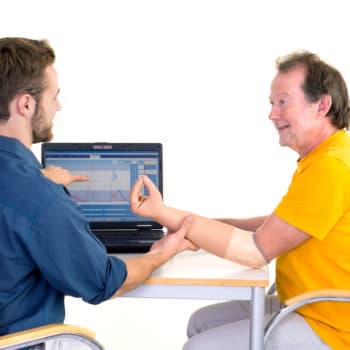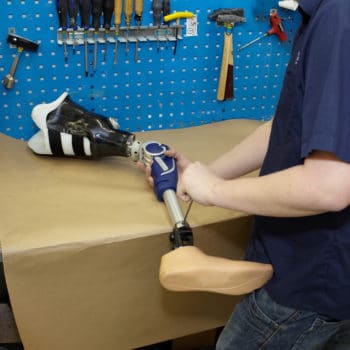Why We Love It
-
$44,030Potential Avg. Salary
-
16.3%Job Growth Rate
-
Growing DemandJob Outlook
-
Dependable Daily WorkloadCareer Attribute
Licensed vocational nurses provide basic bedside care to patients. They work under the supervision of licensed physicians and registered nurses to provide competent care to elderly, sick, impaired and injured patients.
Recommended Schools
What is a Licensed Vocational Nurse (LVN)?
The following responsibilities are common for Licensed Vocational Nurses:
- Examines and records any changes in a patients clinical condition
- Takes specimens like blood, urine or saliva from a patient
- Administers oral in IV medications to patients
- Feeds patients orally or through a feeding tube
- Changes and necessary wound dressings a patient may need to prevent infections
A Day In The Life
Licences vocational nurses, also called LVN’s, provide medical comfort and care for patients by checking vital statistics, changing bandages, and assisting patients to dress, walk or eat. They also monitor and record a patients medical records, speak with patients that have any concerns and also keep the patients physicians and other care givers current on their health status.
They will monitor their patients conditions and also administer any medications their patients may need. They may also collect blood or urine samples, assist their patients with bathing and other personal hygiene care. Another important part of their daily job is teaching the families or home health care providers how to properly provide preventative care at home for their loved ones.
Typical Work Schedule
Most licensed vocational nurses (LVNs) work full-time for 8 hour-shifts for 40 hours per week. There are occasionally few part-time positions available to LVNs but this is usually not the regular case. LVNs and LPNs work under the supervision of registered nurses and physicians. They are expected to work on rotating shifts that may include evenings, weekends, and holidays providing healthcare whenever needed. Additionally, shifts will vary in length with some longer than eight hours especially during emergencies. The job can be exhausting and stressful as it is expected of them to be able to stand on their feet most of the day, help lift or move patients.
Projected job growth
According to the US Bureau of Labor statistics, there are currently more than 720,000 licensed nurses in the US. The demand for LVNs is expected to increase by 9% from 2019 to 2029 which is faster than the average for all other jobs. This is mainly attributed to the fact that as the population ages with more advanced health care. The overall demand for healthcare services including LVNs will be vital in many medical institutions as well as residential spaces. Additionally, some diseases as diabetes, obesity and other chronic conditions have lately increased which will also increase the demand. The growth in demand will make the job market promising to fresh graduates. You should face problems finding a suitable career as long as you have the right qualifications and training in the field. Additionally, specific education, experience and certification in a specialty area such as gerontology or intravenous therapy can be advantage that helps you find better opportunities.
Typical Employers
Licensed vocational nurse (LVN) is a job title mainly specific to Texas and California. The typical employers of LVNs include nursing and residential care facilities. In addition, private and public hospitals of different sizes can also provide job opportunities. Other options include working in private clinics or providing individual home healthcare services. Few LVNs prefer to work for the government for one of its agencies as blood banks, psychiatric hospitals, correctional facilities and vocational nursing programs.
Recommended Schools
How To Become a Licensed Vocational Nurse (LVN)
The very first step to becoming a licensed vocational nurse is to first enroll in a healthcare or nursing associates program. Those wanting to pursue nursing are also required to obtain an accredited certification in the state they wish to be employed in. The LVN certification programs typically take up to one year to complete and include coursework in nursing, pharmacology, biology, anatomy & physiology and psychology. Students can generally can complete their education and begin working within two years time. It can also be a career that can be a great starting point for an individual that wishes to further their education and employment opportunities in the nursing and medical fields. Supervised clinical experience is also required for this occupation to work on student practical and interpersonal skills with hands-on experience. Upon graduating from an accredited program, candidates may then apply to the state board of nursing. Once deemed eligible, they must then pass the state licensure exam. After completion of this certification program and examination, students are then required to take the National Council Licensure Examination for Vocational Nurses, or NCLEX-VN. This mandatory exam is also administered by your states Board of Nursing.
These individuals should also be compassionate, empathetic and sympathetic with a genuine desire to help their patients. They should also possess excellent communication skills, both written and verbal. As well as being capable of working both independently and as a team with physicians, other nurses and other healthcare personnel.
Licensed Vocational Nurse (LVN) Salary Data
We’ve provided you the following to learn more about this career. The salary and growth data on this page comes from recently published Bureau of Labor Statistics data while the recommendations and editorial content are based on our research.
National Anual Salary
Low Range
$36,300Average
$44,030High Range
$59,510National Hourly Wage
Low Range
$17/hrAverage
$21/hrHigh Range
$29/hrHow do Licensed Vocational Nurse (LVN) salaries stack up to other jobs across the country? Based on the latest jobs data nationwide, Licensed Vocational Nurse (LVN)'s can make an average annual salary of $44,030, or $21 per hour. This makes it an Above Average Salary. On the lower end, they can make $36,300 or $17 per hour, perhaps when just starting out or based on the state you live in.
Salary Rankings And Facts
#468 Nationally for All Careers
Programs and Degrees
Here are the most common degrees for becoming a Licensed Vocational Nurse (LVN). a is usually recommended and specifically a degree or coursework that prepares you for the particular field, see below.
Highest Education Among Licensed Vocational Nurse (LVN)s
- 0.4% Doctorate
- 0.6% Masters
- 4.8% Bachelors
- 18.7% Associates
- 55.4% College
- 18.6% High School
- 1.4% Less than High School
Job Growth Projections and Forecast
2014 Total Jobs
719,9002024 Est. Jobs
837,200Job Growth Rate
16.3%Est. New Jobs
117,300How does Licensed Vocational Nurse (LVN) job growth stack up to other jobs across the country? By 2024, there will be a change of 117,300 jobs for a total of 837,200 people employed in the career nationwide. This is a 16.3% change in growth over the next ten years, giving the career a growth rate nationwide of Below Average.
Growth Rankings And Facts
#89 Nationally for All Careers
What Companies Employ The Most Licensed Vocational Nurse (LVN)s
| Industry | Current Jobs | New Jobs Needed | % Increase |
|---|---|---|---|
| Nursing care facilities (skilled nursing facilities) | 212,100 | 13,500 | 14% |
| Offices of physicians | 92,400 | 20,800 | 21% |
| General medical and surgical hospitals; private | 79,900 | -11,500 | -12% |














